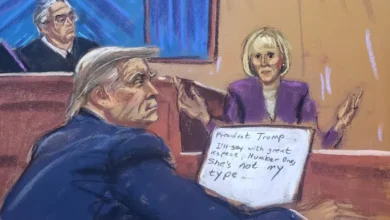The future of US aid to Ukraine may depend on the next House Speaker

Speaker Kevin McCarthy’s ouster on Tuesday could signal a shift in the US House of Representatives on aid to Ukraine, with some of his possible successors strongly in favor of assisting Kyiv but others staunchly opposed.
The House voted for the first time on Tuesday to remove its leader, as eight of McCarthy’s fellow Republicans voted with 208 Democrats against him. There was no immediate indication of who might succeed McCarthy, but the next speaker could quash more Ukraine aid before a proposal reaches the House floor if that person opposes the idea.
The vote to oust McCarthy came just three days after he led the House to pass a stopgap spending bill to prevent a government shutdown that included no new money for Ukraine, highlighting the reluctance of some members of his caucus to back Ukraine funds.
A Ukraine “report card” by Defending Democracy Together’s “Republicans for Ukraine” campaign rated the leading candidates on the strength of their support for past Ukraine aid. Republican opponents of the aid view it as excessive spending and a misplaced US policy priority.
Those ratings ranging from A to F — signifying support or opposition to prior bills — could indicate how likely each would be to bring Ukraine aid to a vote if he becomes speaker.
Representative Tom Emmer, the House Republican whip, got the highest rating, an A. Representative Steve Scalise, the No. 2 House Republican, has long been favored to take over as speaker after McCarthy and received one notch lower, a B.
Representative Matt Gaetz, who led the push to oust McCarthy, has said he would support Scalise.
Gaetz himself, House Judiciary Committee Chair Jim Jordan and hardline rising star Representative Byron Donalds all received Fs.
The White House said on Tuesday it was confident that the United States would ultimately provide more assistance for Ukraine, no matter the fate of McCarthy’s speakership.
McCarthy, who got a B-minus grade, early this week denied accusations by Gaetz that he had cut “a secret deal” with Biden to allow the House to vote on Ukraine aid. McCarthy said then he wanted more information from the Biden administration.
President Joe Biden asked Congress in July to approve another $24 billion related to Ukraine, which Ukraine supporters – Republicans as well as Democrats – had hoped could become law as part of a spending bill.










